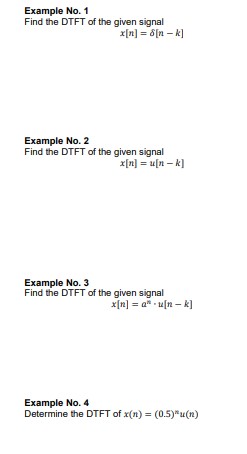Find the DTFT of the given signal x[n] = δ[n - k]. Find the DTFT of the given signal x[n] = u[n - k]. Find the DTFT of the given signal x[n] = a^n * u[n - k]. Determine the DTFT of... Find the DTFT of the given signal x[n] = δ[n - k]. Find the DTFT of the given signal x[n] = u[n - k]. Find the DTFT of the given signal x[n] = a^n * u[n - k]. Determine the DTFT of x[n] = (0.5)*u[n].

Understand the Problem
The question asks to find the Discrete-Time Fourier Transform (DTFT) for specific signals given in mathematical form. Each example requires applying the DTFT definition to the corresponding signal equations.
Answer
1. $X(e^{j\omega}) = e^{-j\omega k}$ 2. $X(e^{j\omega}) = \frac{e^{-j\omega k}}{1 - e^{-j\omega}}$ 3. $X(e^{j\omega}) = \frac{a^k e^{-j\omega k}}{1 - a e^{-j\omega}}$ 4. $X(e^{j\omega}) = \frac{0.5}{1 - e^{-j\omega}}$
Answer for screen readers
-
DTFT of $x[n] = δ[n - k]$: $$ X(e^{j\omega}) = e^{-j\omega k} $$
-
DTFT of $x[n] = u[n - k]$: $$ X(e^{j\omega}) = \frac{e^{-j\omega k}}{1 - e^{-j\omega}} $$
-
DTFT of $x[n] = a^n u[n - k]$: $$ X(e^{j\omega}) = \frac{a^k e^{-j\omega k}}{1 - a e^{-j\omega}} $$
-
DTFT of $x[n] = (0.5) u[n]$: $$ X(e^{j\omega}) = \frac{0.5}{1 - e^{-j\omega}} $$
Steps to Solve
-
DTFT of δ[n - k] The Discrete-Time Fourier Transform (DTFT) of the unit impulse function $\delta[n - k]$ is given by the formula: $$ X(e^{j\omega}) = \sum_{n=-\infty}^{\infty} \delta[n - k] e^{-j\omega n} $$ Evaluating this sum results in: $$ X(e^{j\omega}) = e^{-j\omega k} $$
-
DTFT of u[n - k] The DTFT of the unit step function $u[n - k]$ is found using: $$ X(e^{j\omega}) = \sum_{n=-\infty}^{\infty} u[n - k] e^{-j\omega n} $$ Since $u[n - k]$ starts at $n = k$, the summation changes to: $$ X(e^{j\omega}) = \sum_{n=k}^{\infty} e^{-j\omega n} $$ This is a geometric series with first term $e^{-j\omega k}$ and common ratio $e^{-j\omega}$. Thus, we obtain: $$ X(e^{j\omega}) = \frac{e^{-j\omega k}}{1 - e^{-j\omega}} $$
-
DTFT of a^n * u[n - k] The DTFT of the signal $x[n] = a^n u[n - k]$ is calculated as: $$ X(e^{j\omega}) = \sum_{n=k}^{\infty} a^n e^{-j\omega n} $$ This can also be recognized as a geometric series with first term $a^k e^{-j\omega k}$ and common ratio $a e^{-j\omega}$. Therefore, we have: $$ X(e^{j\omega}) = \frac{a^k e^{-j\omega k}}{1 - a e^{-j\omega}} $$
-
DTFT of (0.5) * u[n] For the signal $x[n] = (0.5)u[n]$, we calculate: $$ X(e^{j\omega}) = 0.5 \sum_{n=0}^{\infty} e^{-j\omega n} $$ This is again a geometric series with first term $1$ and common ratio $e^{-j\omega}$, yielding: $$ X(e^{j\omega}) = 0.5 \cdot \frac{1}{1 - e^{-j\omega}} $$
-
DTFT of $x[n] = δ[n - k]$: $$ X(e^{j\omega}) = e^{-j\omega k} $$
-
DTFT of $x[n] = u[n - k]$: $$ X(e^{j\omega}) = \frac{e^{-j\omega k}}{1 - e^{-j\omega}} $$
-
DTFT of $x[n] = a^n u[n - k]$: $$ X(e^{j\omega}) = \frac{a^k e^{-j\omega k}}{1 - a e^{-j\omega}} $$
-
DTFT of $x[n] = (0.5) u[n]$: $$ X(e^{j\omega}) = \frac{0.5}{1 - e^{-j\omega}} $$
More Information
The Discrete-Time Fourier Transform (DTFT) is a fundamental tool in signal processing, allowing us to analyze signals in the frequency domain. The DTFT of the unit impulse function captures its shifting property, while that of the unit step function illustrates the spectral representation of a constant signal. Adjusting the scaling factor in signals affects their DTFT, as seen in the last example where a scaling factor of 0.5 appears in the results.
Tips
- Confusing the limits of the summation for different types of signals, especially when $u[n-k]$ shifts the starting index.
- Not recognizing the geometric series form, which can lead to incorrect summation results.
- Forgetting to include scaling factors in the final DTFT expression, particularly with constant multipliers.
AI-generated content may contain errors. Please verify critical information